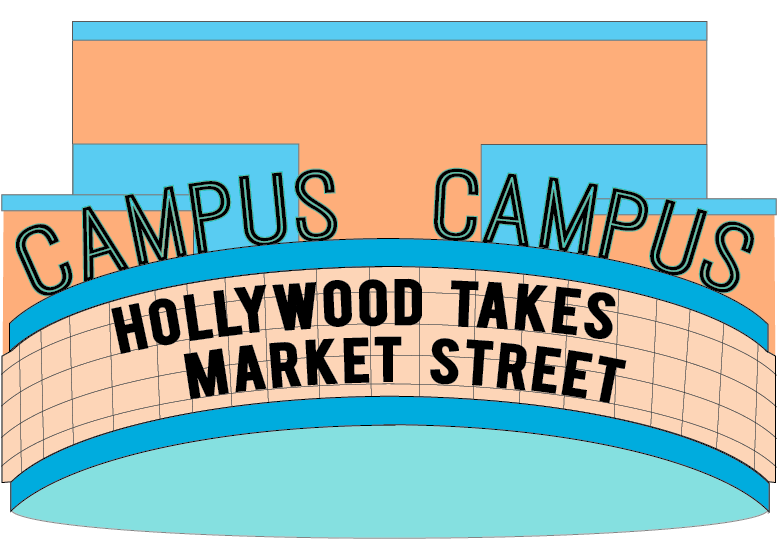Hollywood and more take Market Street: the Campus Theatre
April 12, 2018
The historic Campus Theatre
Regardless of a student’s area of study, all University students are sure to encounter the historic Campus Theatre at some point throughout their college careers.
The theatre is located at the center of Market Street, nestled in the heart of Lewisburg. The Campus Theatre opened in January 1941, modeled by the Stiefel Brothers with Art Deco style architecture. The theatre is one of the last single-screen Art Deco movie theatres in the country.
Those majoring in Film/Media Studies at the University utilize the Campus Theatre for a myriad of screenings. The University has played a large role in the preservation of the theater’s beauty, and has become a main source of movie screenings for various University classes.
Sam Blount ’20 took the course “U.S./Mexican Border Through Film” last semester, and attended the theatre for weekly screenings.
“The Campus Theatre is very homey and has all the amenities of a movie theater, while still feeling like a Bucknell space. It’s really cool that it is a theater and the community can go there, but it can also be used for academic courses so that you can get the big film screen instead of watching a movie on a projector in the classroom or at home on a laptop,” Blount said.
The University’s Film/Media studies major offers weekly presentations on the big screen at the Campus Theatre. Currently, there are four series that take place on different nights of the week.
The different series
“Introduction to Film/Media Studies” focuses on the formal elements of cinema and teaches students how to view film through a critical lens. The films selected include those by some of the most iconic directors, such as Alfred Hitchcock, and facilitate conversations surrounding the form and content of films. These screenings begin at 7 p.m. on Monday evenings, and are free and open to the public.
The Tuesday evening screenings feature recent foreign and independent films from the vast repertoire of the cinematic world.
Currently, faculty teaching associate Rebecca Meyers acts as the academic film programmer for the Tuesday night film series. Screenings begin every Tuesday evening at 7 p.m. Admission is free for University students and $2 for the public.
Most screenings open with an introduction of the film’s setting and filmmakers motives, allowing viewers to completely contextualize the films presented. On occasion, the filmmaker is available to attend the screening and facilitate a question and answer session for those interested.
“I love the Tuesday night film series because it gives people at Bucknell and in the Lewisburg community the chance to discover great films that they would most likely never otherwise find. They can see a description of the film, be curious, and go and experience a terrific work of art… for $2,” associate professor of comparative humanities John Hunter said.
“The Tuesday Night Series is a great way to expose yourself to unique film — whether it be foreign, old, or contemporary, each film is something you know you can’t always see elsewhere and is well worth your while!” Camilla Bowin ’20 said.
Students enrolled in the “Film Theory” class are required to attend the Tuesday Series. The class encourages students to conceptualize film as a medium, as well as an art form. The films selected facilitate conversation surrounding cinema’s power to communicate political and social messages, and can help to shape viewers’ identities and perceptions of the world in manners that many do not realize.
“When I took Film Theory last year, we watched a range of different movies. Even though they were all really different, they were all amazing and super entertaining… they were also movies that I’d either really been wanting to watch, or movies that I would love to watch again,” Emilee Bae ’19 said.
“History of Hollywood” students are required to attend the Friday screenings at 2 p.m. These films focus on understanding Hollywood cinema and how the industry shapes and reflects social, cultural, and political ideologies. These screenings are free and open to the public.
The importance for screenings
Today movies are often independently screened at home on a small laptop screen; however, this is not how these works were intended to be watched. Cinema is created for the big screen, where the image is large, and the sound is enhanced. Cinema is also intended to be viewed in the company of an audience. Being an audience member creates a shared experience for all present.
“It’s the best investment anyone could make given that it could lead to a lifetime of pleasure discovered in films that aren’t from the Hollywood mainstream. Plus, they get to see the film on a big screen with popcorn — that beats your laptop or TV screen every time,” Hunter said.
“I will say if you are into film in general, this program will never let you down. Throughout the semester, you can see different format and genres of film from all around the world. If you get lucky, you can even see the projection of a 35mm for real, [or] sometimes even talk to the filmmaker in person. And, it is free! It’s been my perfect Tuesday night getaway,” Film/Media Studies major Alex Gao ’19 said.






















